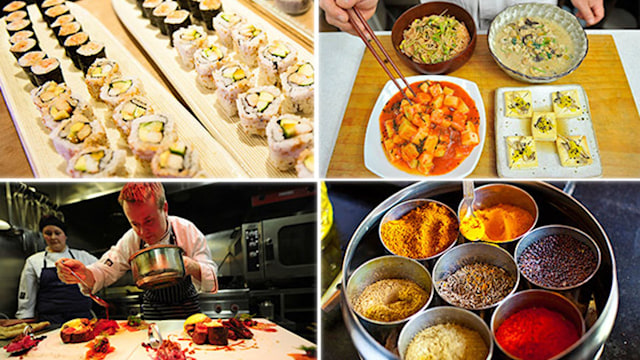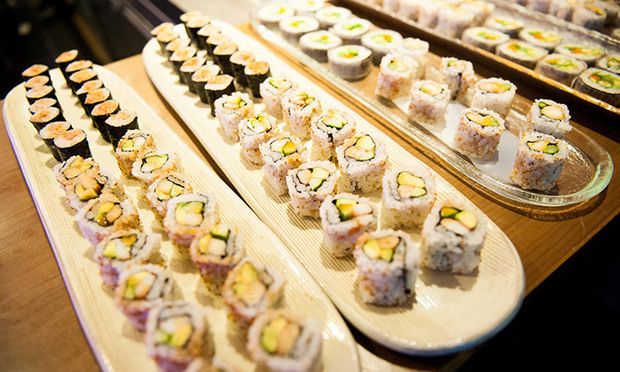Have you ever wondered how the French maintain their slim figures or why, despite large bowls of pasta and late dinners, Italians are one of the healthiest nations? We've asked a group of nutritionists to select the best foods and diet tips from around the world to give us inspiration this year. From the health benefits of sushi, to why Ethiopia has one of the world's healthiest diets, we have plenty for you to choose from to get healthy in 2016!
JAPAN: THE SIMPLICITY OF SUSHI"This is one of the healthiest diets in the world," says leading nutritionist Dr. Marilyn Glenville, who specializes in women's health. "The fish is supplying important Omega 3 fatty acids, which are known to reduce the risk of heart disease and strokes. Both the cruciferous vegetables and fermented soya have been shown to reduce the risk of breast cancer as they have a balancing effect on hormones.
"The Japanese also eat lots of seaweed (sea vegetables) that contains important trace minerals like selenium and iodine for healthy thyroid function. Sushi, the most popular dish in Japan, provides energy but it's also low in fat and high in omega acids that keeps blood healthy. In general, many Japanese vegetables are unprocessed which means greater levels of vitamins and minerals."
ICELAND: KEEP IT FRESHWhen it comes to food, Icelanders keep things simple – fresh seafood, lean lamb. Most foods are grown and produced locally with hardly any pesticide use. Dairy products are often higher quality than ours, as first Nordic settlers to Iceland had a good knowledge of food preserving. "High-quality yogurts with beneficial bacteria are a must in an Icelander’s daily diet," says Dr. Glenville. "Fresh fish is high in Omega 3 fatty acids, which help keep our hearts and brain healthy. They can help reduce the risk of dementia and Alzheimer’s as well as heart disease and strokes."
THE MEDITERRANEAN: A DREAM DIETSeafood, olive oil, vegetables, fruit and grains – all these healthy foods, packed with vitamins and minerals, have been linked to a reduced risk of heart disease and diabetes. Although Mediterranean dishes usually contain some cheese and meat, they are used in moderation.
"High amounts of olive oil lower the levels of total blood cholesterol and fight inflammation. The Mediterranean diet also emphasizes fish high in Omega 3 fatty acids and foods containing antioxidants that can reduce the risk of memory loss and decrease brain function, as we get older," says Sharon Morey, nutritionist at Quest Vitamins.
ETHIOPIA: HIGH-NUTRIENT GRAINSEthiopian cuisine is low in fat and high in nutrients with grains being the main component. Teff – a whole grain high in fiber, iron, protein and calcium is used to prepare most of the dishes. "Grains are crucial in promoting digestive health and reducing the risk of bowel cancer," says Dr. Glenville. The most famous Ethiopian salad, Azifa, eaten with brown rice or pita bread, consists of green lentil. "Lentils, which are high in fiber and protein but low in fat, are also classed as phytoestrogens with a balancing effect on hormones, both for men and women," she adds.
FRANCE: SAY OUI TO RED WINEHow do the French stay slim and healthy even though their diet is high in fat and carbs? Apart from cheese and baguettes, the French also tend to drink red wine with their dinner, which is packed with resveratrol.
"This powerful antioxidant is produced in plants to defend them from invading microorganisms. It can not only protect you from damaging free radicals but it also boosts cell replication. By promoting a healthy, inflammatory response in our body it delays the premature ageing process. A recent study shows that there has never been a drug in the history of pharmaceuticals that speeds up cells regeneration like resveratrol. Another study suggests that it can turn any additional weight into calorie burning 'brown' fat," explains Michela Vagnini, nutritionist at Naturesplus.
CHINA: TEA'S THE KEY"Using chopsticks can help you to slow down while eating, which may ultimately decrease the amount of food eaten. Digestion starts in the mouth and as we chew we are releasing salivary enzymes like amylase that begin the breakdown of food, specifically carbohydrates," Elouise Bauskis, nutritionist at Nutricentre. "The more you chew your food, the smaller the particles will be as they pass into the stomach and the easier they are to digest, meaning you will be getting more nutrients from your food from easier absorption. You will find green tea in every Chinese house, which is their favorite hot drink. It eliminates toxins, aids digestion and curbs cravings. It can also fight free radicals, which cause cancer and heart disease."
INDIA: SPICE THINGS UP Indian cuisine includes a host of spices, which not only add flavor and appealing color but also great health benefits. "Turmeric has significant anti-inflammatory effects and helps relieve the symptoms of IBS. Ginger is very effective in easing discomfort in the stomach. It also promotes the elimination of excessive gas from the digestive system and soothes your gut," explains Adrienne Benjamin, nutritionist at Provenprobiotics.
To refresh themselves, Indians drink Lassi – a traditional, yogurt-based drink. "Made of fermented milk and often flavored with mint or mango, this healthy beverage is rich in 'friendly bacteria' and aids digestion," adds Adrienne.


